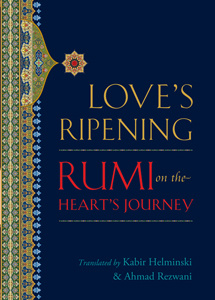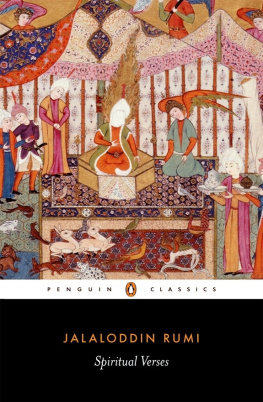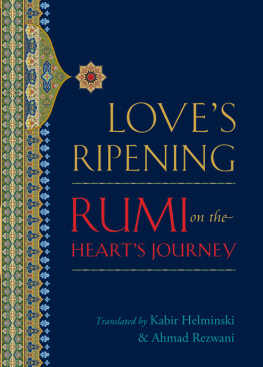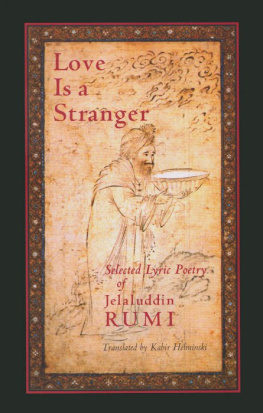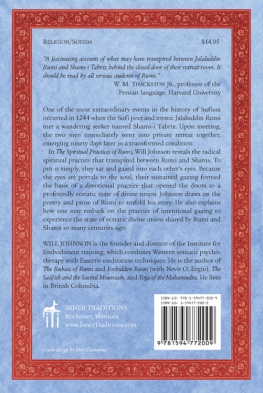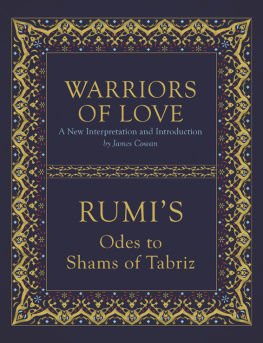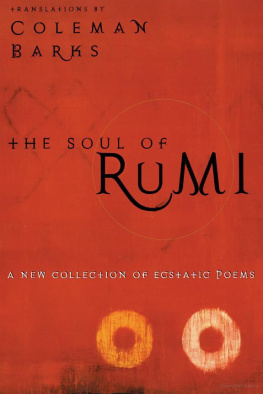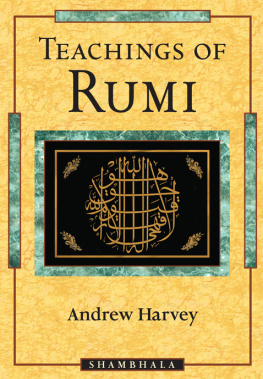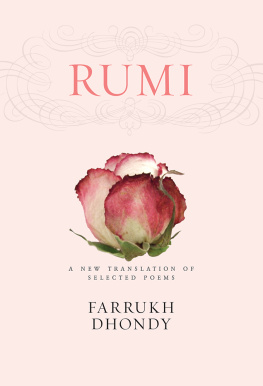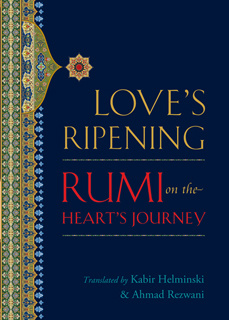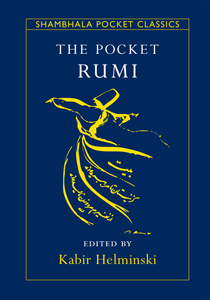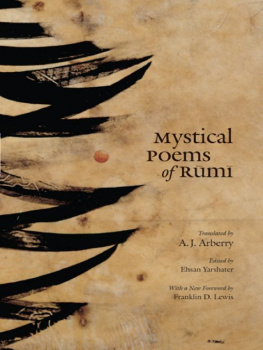Mevlana Jalaluddin Rumi - The Pocket Rumi
Here you can read online Mevlana Jalaluddin Rumi - The Pocket Rumi full text of the book (entire story) in english for free. Download pdf and epub, get meaning, cover and reviews about this ebook. publisher: Shambhala, genre: Art. Description of the work, (preface) as well as reviews are available. Best literature library LitArk.com created for fans of good reading and offers a wide selection of genres:
Romance novel
Science fiction
Adventure
Detective
Science
History
Home and family
Prose
Art
Politics
Computer
Non-fiction
Religion
Business
Children
Humor
Choose a favorite category and find really read worthwhile books. Enjoy immersion in the world of imagination, feel the emotions of the characters or learn something new for yourself, make an fascinating discovery.
- Book:The Pocket Rumi
- Author:
- Publisher:Shambhala
- Genre:
- Rating:4 / 5
- Favourites:Add to favourites
- Your mark:
- 80
- 1
- 2
- 3
- 4
- 5
The Pocket Rumi: summary, description and annotation
We offer to read an annotation, description, summary or preface (depends on what the author of the book "The Pocket Rumi" wrote himself). If you haven't found the necessary information about the book — write in the comments, we will try to find it.
The Pocket Rumi — read online for free the complete book (whole text) full work
Below is the text of the book, divided by pages. System saving the place of the last page read, allows you to conveniently read the book "The Pocket Rumi" online for free, without having to search again every time where you left off. Put a bookmark, and you can go to the page where you finished reading at any time.
Font size:
Interval:
Bookmark:
ABOUT THE BOOK The cry of the soul in love with God has never been more eloquently expressed than by the great Persian Sufi master Jalaluddin Rumi (12071273). Readers have thrilled to his ecstatic songs of divine union for more than eight hundred years. Here is a collection of the best of Rumis poetry. JALALUDDIN RUMI (12071273) was not only a poet, mystic, and the founder of a Sufi order, he was a man of profound insight into the nature of human existence and possibly the greatest mystical poet of any age. KABIR HELMINSKI is the author of Living Presence: A Sufi Way to Mindfulness and the Essential Self, as well as the translator of numerous books of Sufi literature and especially Rumi. He is the codirector, with his wife, Camille Helminski, of the Threshold Society, a nonprofit organization dedicated to sharing the knowledge and practice of Sufism.
As the publisher of Threshold Books for some twenty years, he was largely responsible for making Rumi the most widely read poet of our time. As a producer and writer of Sufi music, he has gained recognition for numerous recordings, including his own Garden within the Flames. He is a representative of the Mevlevi tradition founded by Jalaluddin Rumi. Sign up to learn more about our books and receive special offers from Shambhala Publications.  Or visit us online to sign up at shambhala.com/eshambhala. THE POCKET RUMI
Or visit us online to sign up at shambhala.com/eshambhala. THE POCKET RUMI  Edited by KABIR HELMINSKI
Edited by KABIR HELMINSKI  SHAMBHALA Boston & London 2011 Shambhala Publications, Inc. Horticultural Hall 300 Massachusetts Avenue Boston, Massachusetts 02115 www.shambhala.com 2001 by Kabir Helminski All rights reserved.
SHAMBHALA Boston & London 2011 Shambhala Publications, Inc. Horticultural Hall 300 Massachusetts Avenue Boston, Massachusetts 02115 www.shambhala.com 2001 by Kabir Helminski All rights reserved.
No part of this book may be reproduced in any form or by any means, electronic or mechanical, including photocopying, recording, or by any information storage and retrieval system, without permission in writing from the publisher. Library of Congress Cataloging-in-Publication Data Jalal al-Din Rumi, Maulana, 12071273. [Selections. English. 2008] The pocket Rumi / edited by Kabir Helminski.1st ed. cm. Poems. eISBN 978-0-8348-2505-5 ISBN 978-1-5903-0635-2 (pbk.: alk. paper) I. paper) I.
Helminski, Kabir Edmund, 1947 II. Title. PK6480.E5H438 2008 808.81dc22 2008018099 The Logos is digging a channel for water to reach the next generation. During every generation there is one who brings the word of God; still the sayings of those who have come before are helpful. MATHNAWI III, 25372538 Our Master Jalluddin W ho is this Rumi who has become one of the most popular voices on the contemporary literary and spiritual scene? Why does he speak so compellingly to our sensibilities at this time? What need does he fill? What wound does he help to heal? How is it that a thirteenth-century Islamic saint should become the darling of so many who profess an interest in neither poetry nor spiritual discipline? In the mosques, in academia, in the cafs, and in the studios of Hollywood people are reading and, moreover, quoting Rumi. There is no doubt that he is one of the great literary figures of all time.
Within Islamic cultures, especially from the Balkans, through Turkey, Iran, to Pakistan and India, he is deeply loved. His works include a massive collection of lyric poems (ghazels and rubaiyat) as well as the six-volume Mathnawi, a collection of rhymed couplets that weaves together a rich fabric of stories, humor, and spiritual teaching. The pivotal event in Rumis life was his meeting with an enigmatic, peripatetic saint named Shamsi Tabrizi. Their encounter somehow kindled a creative and spiritual fire in Rumi that burned for the rest of his life. Rumi saw a reflection of the Divine in Shams; through this relationship, Rumi experienced the Divine with an unprecedented power. In some of Rumis more ecstatic verses the boundaries between the Divine and the human are blurred.
Yet Sufis have always maintained a fastidious distinction between the servant (the human being) and Lord (the Divine). In the mysticism of Islam there is no room for idolatry, material or human. It is a poetic tradition, especially in the odes and quatrains, to push the metaphors of sensual love and intoxication to their limits, for nothing else can convey the overwhelming nature of the encounter with the Divine. In our Western literary tradition we have not been prepared for this union of the sensual and the spiritual. Our own cultural history has bifurcated: religion in one direction and literature in another. The division was much less pronounced within Islamin fact, it was practically nonexistent.
The Sufis, especially, were neither puritanical nor sensually indulgent. They followed the middle way of Muhammad, which included marriage, a socially useful livelihood, and a life in the world but not of it. In Rumi we have a model of the potential harmony between the physical and the spiritual, the heart and the mind, the finite and the Infinite, the human and the Divine. Rumi was not a narrowly religious personality, nor was he a proponent of some form of mystical eroticism, nor was he a Promethean rebel. It would surprise many that this passionate and ecstatic man of God made a living during his entire life partly through legal consultations within the framework of Islamic law. He prayed and fasted as any Muslim would, but he challenged the hypocritical and one-dimensional religion that is always the enemy of real spirituality.
Mevlna Jalluddin Rumi penetrated to the heart of Reality and returned with the fragrance and flavor of Truth. Not only is he one of the greatest literary geniuses, but, perhaps more importantly, he also addresses the most important subject that can be addressed: the human beings relationship with the Divine, with Truth itself. While entertaining, inspiring, informing, and subtly guiding us, Rumis words touch us at the level where we most need to be touched: the very depths of our hearts. In doing so, Rumi never places himself in an exalted position in relation to his readers. He is a human being like us, though perhaps more patient, more humble, more forgiving, more flexible than most. This is another aspect of his greatness: that there was no discrepancy between his words and his life.
His humanness and his approachability, however, may mislead us if it causes us to reduce his thought to our own level. Yet we can only begin where we are, and everyone takes from Mevlna what she or he can. Our culture, I am sure, is only beginning to understand what is contained in Rumi, and the challenge we face is to be able to map his insight and wisdom to our own human experience. Kabir HelminskiPostscript: Much of this material has been published before, although the quatrains are new, as well as The Tale of the Bedouin and His Wife. Many of the poems that had no titles have been given titles, and I have revised about fifteen percent of the previously published material. Kabir and Camille Helminski with Lida Saedian In comfort and abundance the Friend raised me.
With vein and skin He tailored this ragged body. Its just a robe worn by a Sufi, the heart. The whole universe is a khaneqah and He is my Shaikh. When I am with you our loving wont let me sleep. Away from you the tears wont let me sleep. God, its amazing to be awake both nights, But how different these awakenings are! I have no companion but Love, no beginning, no end, no dawn.
The Soul calls from within me: You, ignorant of the way of Love, set Me free. I dreamed of the most exquisite Cupbearer, a glass of red elixir in hand, perfect in servanthood. Could this be our real master? The lover is forever like a drunkard whose secrets spill out, forever mad, frenzied, and in love. To be self-conscious is to worry about everything, but once drunk, what will be will be. Love is the path and direction of our Prophet. We are born from Love; Love is our mother.
Next pageFont size:
Interval:
Bookmark:
Similar books «The Pocket Rumi»
Look at similar books to The Pocket Rumi. We have selected literature similar in name and meaning in the hope of providing readers with more options to find new, interesting, not yet read works.
Discussion, reviews of the book The Pocket Rumi and just readers' own opinions. Leave your comments, write what you think about the work, its meaning or the main characters. Specify what exactly you liked and what you didn't like, and why you think so.

